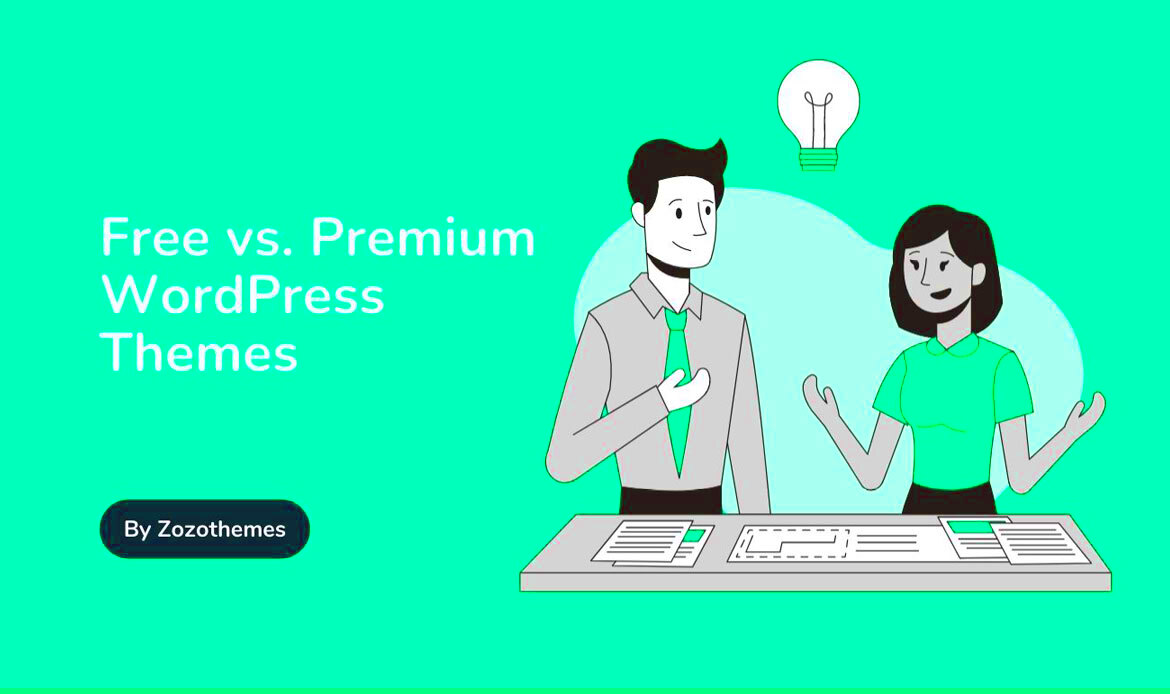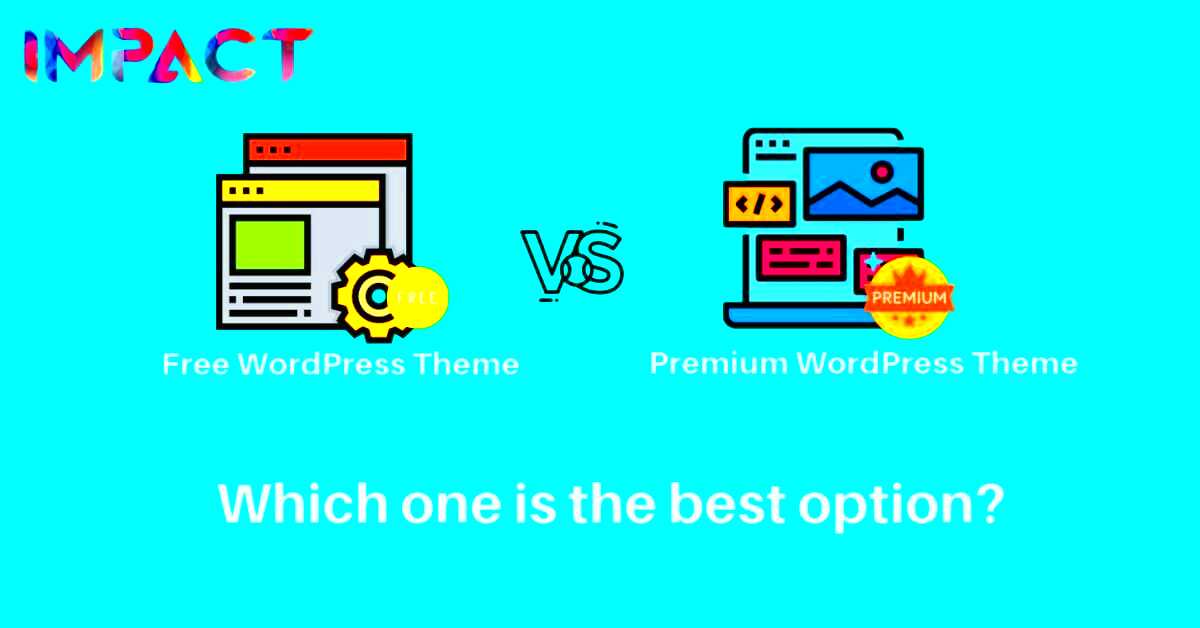Are you starting a new website or thinking about sprucing up your existing one? One of the most exciting yet daunting tasks is choosing the right WordPress theme. With countless options available, it’s easy to get overwhelmed. In this post, we’ll dive into the differences between free and premium WordPress themes, helping you decide which option is best suited for your needs. Let’s explore the pros and cons of each so you can make an informed choice that caters to your goals!
Understanding WordPress Themes

Before we jump into the debate of free vs. premium themes, it’s important to understand what WordPress themes are and how they work. At a basic level:
- Definition: A WordPress theme is a collection of files that dictate the design, layout, and functionalities of your website.
- Components: Themes usually include:
- Templates: Define the structure of your pages
- Stylesheets: Control the look and feel
- JavaScript: Add interactivity
- Customization: Most themes allow for some level of customization, whether it’s through WordPress’s native customizer or a theme-specific options panel.
Choosing the right theme can be crucial, as it influences not just aesthetics but also user experience and even SEO. Here are some key considerations when exploring WordPress themes:
| Aspect | Free Themes | Premium Themes |
|---|---|---|
| Cost | Free | Varies (typically $30 – $200+) |
| Customization Options | Limited | Extensive |
| Support | Community support | Dedicated support (often faster) |
| Updates | Irregular | Regular updates and improvements |
Understanding these elements will help you make the best decision for your website. So, are you leaning toward the budget-friendly option or the premium choice? Let’s explore that next!
Overview of Free WordPress Themes
When it comes to building a website using WordPress, one of the first decisions you’ll face is choosing a theme. Free WordPress themes are an enticing option for many individuals and businesses, especially those just starting out or operating on a tight budget. These themes often come from the official
Free themes can be incredibly varied, catering to different styles and functionalities. While they may lack some of the bells and whistles found in premium themes, free themes usually retain the core features necessary for a functional website. Here’s what you can generally expect:
- Basic Customization Options: Many free themes allow simple customization features, such as color changes and font variations. However, options may be limited compared to premium counterparts.
- Responsive Design: Most free themes are designed to be mobile-friendly, ensuring your site looks good on all devices, from desktops to smartphones.
- Limited Support: When using a free theme, you might not have direct access to customer service, relying instead on community forums for assistance.
- Regular Updates: Free themes often receive updates, but the frequency can vary significantly based on the developer’s commitment.
In summary, free WordPress themes are a great starting point, especially for bloggers or small businesses looking to test the waters without financial investment.
Benefits of Free WordPress Themes
Choosing a free WordPress theme comes with a host of benefits, making it an appealing choice for many users. Let’s delve into some of the major advantages:
- No Financial Commitment: The most obvious benefit is that free themes don’t cost you a dime. This is ideal for those just launching a website or for personal projects where budgets are tight.
- Easy Accessibility: Free themes are easily accessible through the WordPress repository. With just a few clicks, you can find a theme that suits your needs, making the setup process quick and straightforward.
- Quality Options: Contrary to popular belief, many free themes are designed by experienced developers who put significant effort into their work. You can find high-quality designs that are both functional and visually appealing.
- Community Support: Free themes often have a large user base, which means that there’s a wealth of community support available. Users can share problems, solutions, and tips, making it easier to troubleshoot issues.
- Testing Grounds: Using a free theme allows you to experiment and find out what you like without the risk of losing money. You can always switch themes later once you understand what features are essential for your site.
Overall, free WordPress themes provide a wonderful opportunity to create a functional, beautiful website without the financial risk, making them an attractive option for many. Especially if you’re just starting, there are plenty of reasons to consider going free!
Limitations of Free WordPress Themes
While free WordPress themes can be incredibly appealing—after all, who doesn’t love a good deal?—they come with their own set of limitations that you might want to consider before making a decision. Here are some of the key drawbacks to keep in mind:
- Limited Customization Options: Free themes often come with fewer customization options. You might find it harder to adjust colors, layouts, or typography to match your brand identity.
- Less Support: Support can be very limited. If you hit a snag, you might be left to figure out the solution on your own or resort to community forums, which aren’t always reliable.
- Frequent Updates: Free themes may not be regularly updated, leaving you vulnerable to security issues or bugs that could affect your website performance.
- Basic Features: Many free themes lack advanced features that are often standard in premium options, such as SEO optimization, eCommerce functionality, or easy integration with plugins.
- Ads and Branding: Some free themes come with ads or forced branding, which can detract from the aesthetics of your site and even annoy your visitors.
So, while free WordPress themes can be a great starting point, they might not be suitable for everyone, especially if you’re looking for a more robust or unique online presence.
Overview of Premium WordPress Themes
Now that we’ve talked about the limitations of free themes, let’s dive into premium WordPress themes. These are paid options that come packed with features and benefits, offering a more tailored experience for website owners:
- Greater Customization: Premium themes typically offer extensive customization options, allowing you to tailor every aspect of your website—from layouts and color schemes to typography and widgets—giving your site a unique look.
- Better Support: Many premium themes come with dedicated customer support. This means you have access to knowledgeable experts who can help you troubleshoot any issues you encounter.
- Frequent Updates: Premium themes are usually updated regularly for security, compatibility, and performance enhancements, ensuring your site is always running at its best.
- Advanced Features: Most premium themes come packed with features like responsive design, SEO optimization, and built-in options for eCommerce, making them versatile for various website needs.
- No Ads or Branding: Because you’re paying for a premium theme, you won’t have to worry about ads or unwanted branding cluttering your site.
Ultimately, premium WordPress themes can provide a better foundation for your website, especially if you care about aesthetics, functionality, and support. It’s worth investing that extra cash if you want to ensure your online presence stands out!
Benefits of Premium WordPress Themes
Choosing the right theme for your WordPress site can be a bit daunting, especially when you’re faced with the age-old question: Free or Premium? While free themes can serve their purpose, premium WordPress themes often come with a plethora of advantages that can transform your site into something special. Here’s a breakdown of the benefits you can expect from premium themes:
- Enhanced Design Options: Premium themes usually boast sophisticated and modern designs. They often include multiple layout choices, color palettes, and customizable elements that make it easy to create a unique look.
- Quality Support: One of the biggest perks of a premium theme is access to dedicated support. Developers often provide timely assistance, ensuring that you can resolve issues quickly and effectively.
- Regular Updates: Premium themes receive regular updates, which means you’ll always have the latest features, security patches, and compatibility improvements. This is crucial in an ever-evolving digital landscape.
- Advanced Functionality: Many premium themes come with built-in functionalities like sliders, galleries, and e-commerce compatibility, saving you the hassle of searching for plugins.
- SEO-friendly: A lot of premium themes are optimized for search engines, ensuring that your site performs well on Google and attracts more visitors.
- Unique Features: Many premium themes offer exclusive features such as demo content, custom widgets, and shortcodes that enable you to do more with your site.
In summary, premium WordPress themes can elevate not just the aesthetics but also the performance and usability of your site—making them a worthy investment for serious website builders.
Limitations of Premium WordPress Themes
While premium WordPress themes come stacked with benefits, they aren’t without their drawbacks. It’s important to carefully consider these limitations before pulling the trigger on a purchase. Here are some common concerns you might have:
- Cost: As the name implies, premium themes come with a price tag. For someone just starting, this cost might not seem justifiable, particularly in comparison to free alternatives.
- Overwhelming Choices: The vast array of features and customization options can sometimes lead to decision fatigue. With so many potential combinations, it can be challenging to settle on a theme that truly suits your needs.
- Compatibility Issues: Some premium themes may not integrate well with certain plugins or page builders. This can potentially lead to functionality hiccups down the road.
- Dependency on the Theme Developer: If the developer stops supporting or updating the theme, you could be left in a dilemma, as your site may become outdated or vulnerable to security risks.
- Learning Curve: If a theme has numerous custom features, it might take time to learn how to navigate and utilize everything effectively, which can slow your website development process.
In essence, while premium WordPress themes can offer significant upgrades to your website experience, they come with their own set of challenges that you need to weigh based on your specific needs and skills. Making an informed choice will help you find the best fit for your project!
Factors to Consider When Choosing a Theme
Choosing the right theme for your WordPress site is crucial, and there are several factors to consider to ensure it aligns perfectly with your needs. Let’s break it down:
- Purpose of Your Website: Are you building a personal blog, a corporate site, or an online store? The purpose will greatly influence your theme choice. Some themes are tailored for specific niches, offering functionalities or layouts that enhance user experience.
- Responsiveness: With mobile browsing on the rise, your theme should be responsive. This means it will look attractive and function properly on all devices, from desktops to smartphones.
- Customization Options: Consider how much control you want over the design. Premium themes often offer greater customization options, like drag-and-drop builders, allowing you to make your site unique without coding knowledge.
- Speed and Performance: A theme that is heavy on features can slow down your website. Look for themes that are optimized for speed to ensure a smooth user experience.
- SEO Friendliness: A theme with good code structure and optimized features can help with search engine rankings. Ensure your theme is built with SEO in mind to maximize visibility.
- User Reviews and Support: Always check user reviews and support options. A theme with a strong community or dedicated support team can save you headaches down the line.
- Updates and Compatibility: Ensure the theme you choose is regularly updated, compatible with the latest version of WordPress, and works well with popular plugins.
Taking these factors into account can save you a lot of time and frustration later, ensuring that your website not only looks great but also functions effectively.
Use Cases for Free Themes
When it comes to WordPress themes, free options can be a great starting point for various projects. Here are a few scenarios where free themes shine:
- Personal Blogs: If you’re just dabbling in blogging or journaling, a free theme often suffices. Options like Astra or Neve provide clean, user-friendly designs that let your content take center stage.
- Small Business Sites: Small businesses with tight budgets can find free themes that look professional without breaking the bank. Themes like OceanWP offer customizable layouts suitable for displaying products or services.
- Non-Profit Organizations: Many non-profits start off with limited funds. Free themes can help you establish an online presence quickly and effectively. Themes designed for charities are often both attractive and functional.
- Portfolio Sites: If you’re a freelancer or artist wanting to showcase your work, plenty of free themes cater to portfolio sites. They usually include galleries and project showcases, allowing you to shine.
- Testing and Learning: New users or developers experimenting with WordPress can benefit from free themes. They provide a risk-free environment to learn without the financial commitment of premium options.
While free themes often come with fewer features and less support than premium ones, they can be a perfect fit for many small-scale projects. It all boils down to what you need and how you plan to grow your website in the future.
11. Use Cases for Premium Themes
When it comes to selecting a WordPress theme, you might find yourself at a crossroads between free and premium options. Premium themes come with a host of features that cater to specific needs and functionalities. Here are some scenarios where choosing a premium theme can be beneficial:
- Business Websites: If you’re launching a corporate site, premium themes often offer advanced customization options, SEO optimization, and compatibility with essential business plugins.
- Online Stores: E-commerce businesses benefit greatly from premium themes designed with shopping functionalities, which include product galleries, shopping carts, and payment gateways.
- Blogging Professionals: For serious bloggers, premium themes often include unique layouts, typography options, and plugins to enhance user experience, helping your content to stand out.
- Portfolio Sites: Creative professionals like photographers and artists can utilize premium themes to showcase their work with stunning visuals, customizable grids, and galleries.
- Membership Sites: If you’re running a site that requires user registrations and memberships, premium themes often come with built-in compatibility for membership plugins.
Ultimately, the investment in a premium theme is worthwhile when you require higher-level support and features that contribute to the success of your online venture. Think about your needs and how a premium theme can elevate your website to meet those demands.
12. Conclusion: Making the Right Choice for Your Website
Deciding between a free and a premium WordPress theme can feel overwhelming, but it all boils down to your unique needs and goals. Here are some guiding points to help you make an informed choice:
- Your Budget: If you’re just starting and funds are limited, a free theme might be the way to go. However, consider investing in a premium theme for long-term projects.
- Functionality: Premium themes will typically provide better functionality and support, especially for complex websites that require specific features.
- Customization: If having a unique look is important for your brand, premium themes often come with advanced customization options compared to their free counterparts.
- Maintenance and Support: Premium themes usually come with dedicated customer support, which can save you time and frustration in the long run.
- SEO and Performance: Premium themes often have better optimization for speed and SEO, which can elevate your site’s visibility in search engines.
In conclusion, whether you choose a free or premium WordPress theme, it’s essential to align your choice with your specific website goals and requirements. Carefully assess your priorities, and you’ll find the option that best suits your needs, paving the way for a successful online presence!



